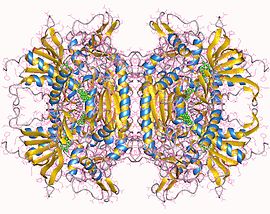In enzymology, a pyranose oxidase (EC 1.1.3.10) is an enzyme that catalyzes the chemical reaction
| pyranose oxidase | |||||||||
|---|---|---|---|---|---|---|---|---|---|
 Pyranose oxidase tetramer, Trametes ochracea | |||||||||
| Identifiers | |||||||||
| EC no. | 1.1.3.10 | ||||||||
| CAS no. | 37250-80-9 | ||||||||
| Databases | |||||||||
| IntEnz | IntEnz view | ||||||||
| BRENDA | BRENDA entry | ||||||||
| ExPASy | NiceZyme view | ||||||||
| KEGG | KEGG entry | ||||||||
| MetaCyc | metabolic pathway | ||||||||
| PRIAM | profile | ||||||||
| PDB structures | RCSB PDB PDBe PDBsum | ||||||||
| Gene Ontology | AmiGO / QuickGO | ||||||||
| |||||||||
- D-glucose + O2 2-dehydro-D-glucose + H2O2
Thus, the two substrates of this enzyme are D-glucose and O2, whereas its two products are 2-dehydro-D-glucose and H2O2.
Pyranose oxidase is able to oxidize D-xylose, L-sorbose, D-galactose,[1] and D-glucono-1,5-lactone, which have the same ring conformation and configuration at C-2, C-3 and C-4.[2]
This enzyme belongs to the family of oxidoreductases, specifically those acting on the CH-OH group of donor with oxygen as acceptor. The systematic name of this enzyme class is pyranose:oxygen 2-oxidoreductase. Other names in common use include glucose 2-oxidase, and pyranose-2-oxidase. This enzyme participates in pentose phosphate pathway. It employs one cofactor, FAD.
Structural studies
editAs of late 2007, 8 structures have been solved for this class of enzymes, with PDB accession codes 1TT0, 1TZL, 2F5V, 2F6C, 2IGK, 2IGM, 2IGN, and 2IGO.
Use in biosensors
editRecently, pyranose oxidase has been gaining on popularity within biosensors.[1] Unlike glucose oxidase, it can produce higher power output, given that it is not glycosylated, has more favorable value of Michaelis-Menten constants, and can catalytically convert both anomers of glucose. It reacts with a wider range of substrates. Pyranose oxidase does not cause an unwanted pH shift. It is also possible to easily express and produce it in high yields using E. coli.[1]
References
edit- ^ a b c Abrera AT, Sützl L, Haltrich D (April 2020). "Pyranose oxidase: A versatile sugar oxidoreductase for bioelectrochemical applications". Bioelectrochemistry. 132: 107409. doi:10.1016/j.bioelechem.2019.107409. PMID 31821902.
- ^ Janssen FW, Ruelius HW (November 1968). "Carbohydrate oxidase, a novel enzyme from Polyporus obtusus. II. Specificity and characterization of reaction products". Biochimica et Biophysica Acta (BBA) - Enzymology. 167 (3): 501–10. doi:10.1016/0005-2744(68)90040-5. PMID 5722278.
Further reading
edit- Machida Y, Nakanishi T (1984). "Purification and properties of pyranose oxidase from Coriolus versicolor". Agricultural and Biological Chemistry. 48 (10): 2463–2470. doi:10.1271/bbb1961.48.2463.
- Neidleman SL, Amon Jr WF, Geigert J (1981). "Process for the production of fructose". Chem. Abstr. 94: 20737.
- Ruelius HW, Kerwin RM, Janssen FW (November 1968). "Carbohydrate oxidase, a novel enzyme from Polyporus obtusus. I. Isolation and purification". Biochimica et Biophysica Acta (BBA) - Enzymology. 167 (3): 493–500. doi:10.1016/0005-2744(68)90039-9. PMID 5725162.
